Something Fickle This Way Comes
So, as discussed previously, I’d gotten my Internet Eireann account, got the Internet religion, was incredibly annoyed that the other colleges gave this stuff (Internet access) out like condoms at Fresher’s Week, and became determined to do something about it. The computer labs in UCD, at that time a hotbed of late nightsNow apparently a defunct institution since everyone has their own computer; Joe Carty, ex-head of C.S., told me that all of that had gone away since everyone just bought their own machine. , used to be where the night-owls and enthusiasts would be found hacking away into the wee hours. That was where I met Steven Fegan, physicist-in-training and also Unix programmer extraordinaire. One of the things that blew my mind when we met first was the fact that he had written his own TCP proxy program, which he would run on the Big Unix Machines in the computer centre and would allow what desktop he was at in whatever computer lab to access the Internet at large, by routing the packets through the Big Iron. Commonplace today, but not that common in 1993. I immediately assumed there was no-one else in the college who was capable of doing that.(Then I spent the next few years discovering, thanks to the Internet, just how much cleverer than myself almost everyone else was. Perhaps I should have stayed away.)
I moaned and whined to my friends Fergal DalyWho I first met through UCD gamesoc circles, but later ended up working with in Google. and Peter CoxNow a landscape photographer of world reknown. about this, together with Steve, and like most ideas, it happened without too much planning. In middle November or late December 1994, late some evening, we were sitting in computer room 135 of the science lecture block, when I turned around and idly said, “Wouldn’t it be a great idea if…“
Again, like most ideas, we immediately dismissed it. It’d never work, we said. (Computing) Services would never let it happen, we said. And that was before we even considered questions of How?, and, Where would we get the cash? So the idea died. For a while. But like all good ideas, it left a little seed of itself, and for some reason, would just not let me go. So I enlisted the people who were to become the nucleus of the first committee: namely Stephen, Fergal, and Peter. Looking back through my earliest emails, the first date I can actually track down as a putative “Netsoc” meeting is the 20th of January, 1995. It wasn’t even called Netsoc then. Half of our early meetings were taken up with working out exactly how we could even theoretically allow 500 people access to the outside Net without every computer on campus spontaneously catching fire.The rest of it was taken up by Fergal Daly coming up with silly names for our first computer. He was particularly fond of “trousers”, I think because then we could say “trousers is down” if we had some operational problem.
We brainstormed. For those of you reading this in the 21st century, we should take a moment to contextualise what we were talking about. There were no smartphones. Indeed, no mobile phones, of any kind, for any student. (In truth, that was about two years away.) If you wanted Internet access, you had to have shitty dialup at home, or you had much much faster campus/commercial network access - although there was much more campus connectivity at that stage. Web apps looked like 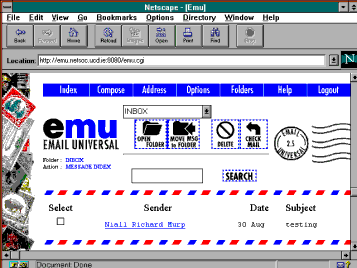
This was a decent enough webapp for the time. the picture on the right, and the UCD website looked like the other picture 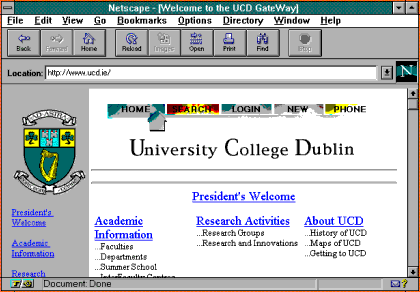
This was a decent-enough website for the time. on the right. This was partially because the default setup for campus computers at that time relied on Windows 3.1 and a bunch of Netware related hacks with fairly bad resolution. Etc. So, like all technical enterprises started by technocrats, we came up with the technical solution fairly quickly; influenced by, amongst other things, the freely available Unix systems of the day, and the Trinity College Dublin Maths Department,Via the tender offices of David Malone. Alan Judge recounts how influential the Maths department was in producing people who could actually do this stuff: “The Maths department Unix systems in Trinity effectively filled the same role as Netsoc and Redbrick back in my day. It was student run and administered, open to all, and attracted the same types of people as the societies. The academics (particularly Tim Murphy and David Simms) just let us have at it as long as we also supported the Maths dept users. We hacked our own software and device drivers, built kernels, ran UUCP mail and USENET systems, and played a lot of nethack.”. we settled on running a Unix server, providing plain text access to email, chat applications, FTP, and a bunch of other things mostly gone the way of the dodo.
But while we had the technical end of it sown up pretty well, we still didn’t know exactly who we were, or how we could do what we wanted. Originally, we’d thought we’d be some student sponsored body operating in concert with the Students Union of the time, along with the very much needed and appreciated support of the S.U. President at the time, Aisling Ni Bhriain. But I found myself thinking that would have essentially involved us becoming a weirdly isolated arm of computer services provision for the student body, and if the next president wasn’t as supportive as this one was, that could be a major problem. We flailed around a bit more.
Eventually it was Steve’s dad, Dave Fegan, who I remember as coming up with the answer, but I don’t know for sure – make it a student society. It solved the “dependent on any particular administration” problem, provided a clear way for governance to happen, provided accountability and helped isolation – as a society, it would not be perceived as part of student services somehow provided anonymously by furiously typing primates in a back room somewhere. The coalition of the willing grew, with classmates, workmates, and more or less anyone who had the misfortune to pause too long when they were nearby pressed into service of the cause: Dave Jordan, Tadhg O’ Higgins, Dave O’ Reilly, Daire Byrne, Niall John Murphy (the reason why I started using my middle name to identify myself), Kevin Roche, Tim Foster, Shakira Kelly, and Adam Egan all contributing towards getting it off the ground. We all pulled together. It was exhilirating having everyone work together in the service of a common vision, and boy, did we work. (For good and for ill, that kind of frenetic pace and focus was a model for how I conducted myself during the most interesting things I did.)
Anyway, we got a proposal together and somehow managed to persuade a) the college authorities to hand over about 3 grand so we could buy a machine and b) Computing Services to get behind the project. In fairness, the then chairman of UCD Computing Services was a Dr. Dennis Jennings, one of the closest things we had to a networking visionary in the country, and he was fully supportive (even handing over 500 quid for extra RAM). The tensions between Computing Services and students, very visible at ground level, were simply not present when myself and Dennis chatted. It reminded me a little of that episode of Yes Prime Minister when the militant leftist is discovered to have more in sympathy with the civil service leadership than perhaps you’d have thought.
So, we had our permission, we had our machine… what else did we need? We spent a certain deal of time figuring that out desperately quickly. There was just a crap-ton of stuff to do. Much of it was pretty easy to understand and get right – what the membership model was, where to get the posters and where to hang them, whether our server, named orca.ucd.ie, needed more RAM, and so on. We were at a dead run for most of the rest of the run-up to launch, and with good reason. It’s illustrative to look at precisely what you got for your 5 Irish Pounds compared to what you get with your 500 EUR smartphone today: full Internet access with proxies (not just the web), Usenet News readers, email (multiple text-only clients) As well as webmail access… although webmail wasn’t actually invented until 1996, in the shape of hotmail.com. , IRC (typically banned by computing services folks because I guess it could be used for entertainment and talking to people), and local instant messaging with the Internet-famous hey program, written by aecolley of TCD Netsoc. We also ran elections for class reps, etc, over the netsoc interface.The topic of computer-based elections will come up again later.
Another thing you’ll notice if you look at that list again was how similar that list was to what the ground-breaking ISPs were doing. We were doing everything those commercial entities were, for in some cases a larger customer base, with an entirely volunteer set of helpers, and in many ways with a higher-quality service level.
We were, if I can put it mildly, bat-shit insane.
No wonder that our main website message had the following text on it for months:
“Our committee consists of 9 people, and we’re all overworked with keeping the machine running and its users happy (if such a thing is possible ! ) Hopefully some day we will be able to concentrate more on the “Social” side of things, and leave the “providing a service” part of our business aside. Education is a big part of what we want to do, even if we don’t always have the resources to do it for everyone in the college.”
That was one of the systemic conflicts at the heart of what we were doing, as with so many other providers before us – we didn’t want to be access providers, we would have preferred if the college did it. But we were forced into it, although our ambition (at that time) was to be something a little bit more like an actual college society rather than an on-campus Internet startup. And, like most startups, I unquestionably sacrificed a lot to make it happen; too much, degree included. However, back at the start of our incredible run, those problems were far in the future.
More Sort of “Resurgence of the Nerds”
Although I was pretty sure that there would be some response from students to what we’d done, I hadn’t quite reckoned on quite how extreme it would be in the first while. I remember setting up the first society stall with Fergal Daly, nervous about whether or not anyone would turn up. Well, I needn’t have worried. Our quota of 500 was used up, not over the week, but well before the end of the first day. They just kept coming, shuffling forward relentlessly, like zombies fixated on email rather than brains. I remember standing up at some point and looking over the heads of the assembled throngs, wondering at what we’d managed to create, and how on earth it was so massively popular. I was confused, too, because I didn’t think word of mouth could have spread from our beta-testing population into the general student population that quickly, but it turned out that a number of people were joining because their other-university friends had heard of us and pushed their friends in turn to sign up for a Netsoc account.
The queueing crowds around the stall during the first year was enough of a fire hazard that College Services requested us to put our second year’s registration desk outside, close to a small, mostly glassed-in building - not much more than a room - that was usually the place where the UCD radio station broadcast from during Fresher’s Week. We were skeptical – having it outside seemed, weather-wise, to be potentially inviting disaster. But we hadn’t reckoned on the compelling power of the Internet. Word got around fast, presumably by the same way as the previous year, and by the time we were setting up the stall there were already people there. We were early, but if you spend some time looking at the picture below, you’ll realise there’s something that’s a bit odd about it, even through the low-fi scanning. The reason for the quality of the light is, of course, that it’s shortly after dawn, and the reason they’re all wearing jackets is because it’s fucking cold.

Similarly to the previous year we had a quota, but this time it was doubled to a thousand. We filled it, again (if I recall correctly) on the first day, and had the rather Soviet experience of turning people away, some of whom had not been fully aware of what they were queueing for. This series of pictures captures the (still, to me) gobsmacking nature of what we’d stumbled across, the sheer desire for this - back then - rather arcane way of communicating and researching:
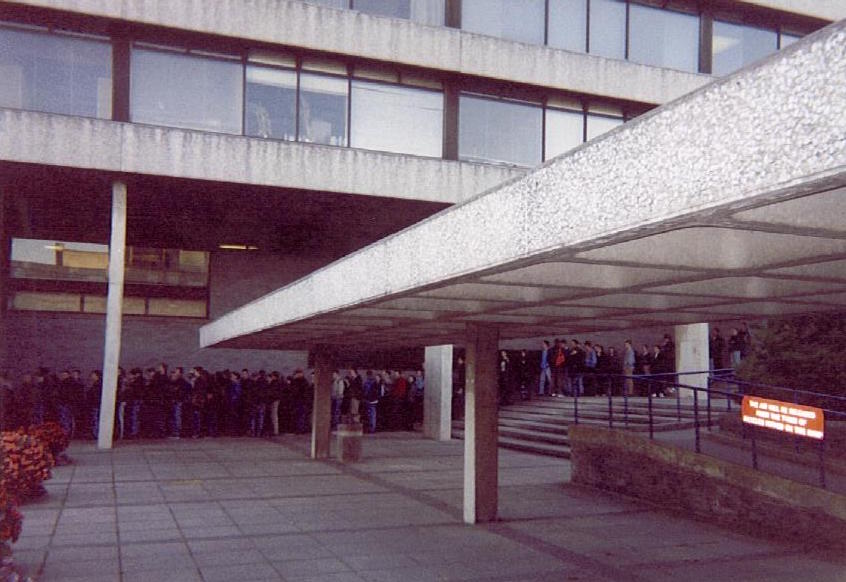
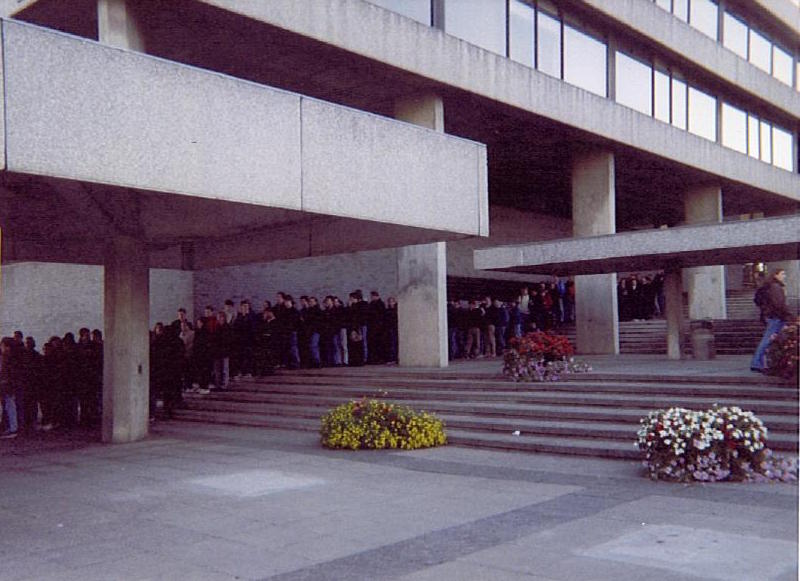
It became so … bad seems the wrong word … notorious? that the University Observer ended a rather snarky article in 1997 (“disconnected @ daedalus”, referring to the then new computer labs) with the following text:
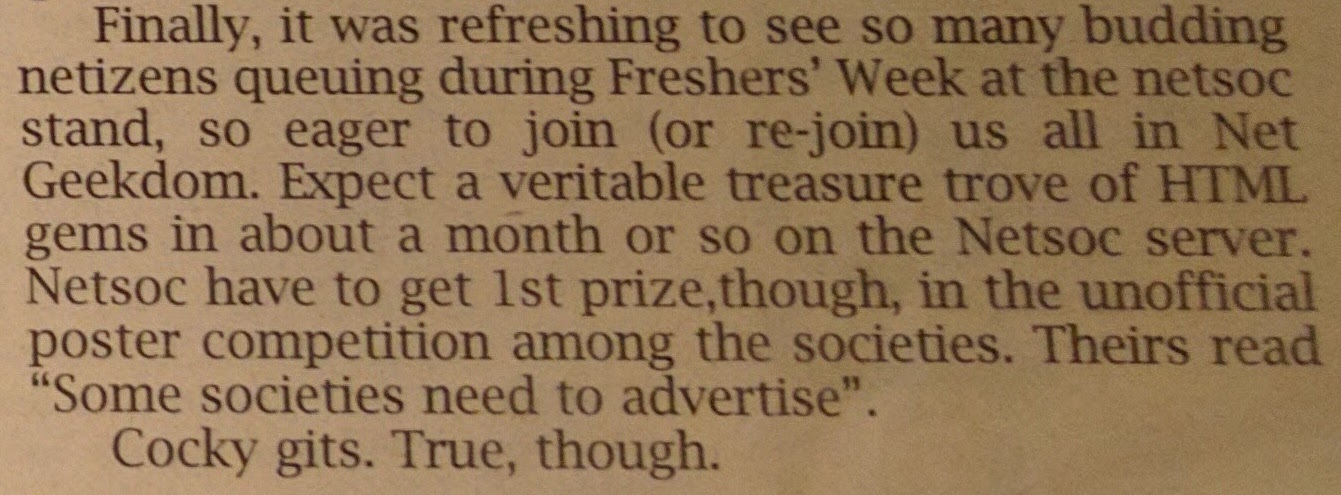
I’d never created something so incredibly popular before, and I likely never will again.Until this, anyway.
Well, all good things, as they say.